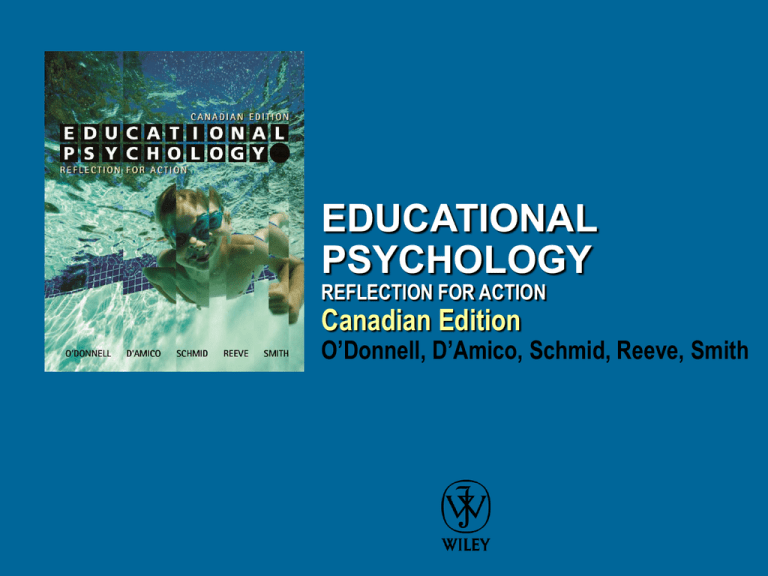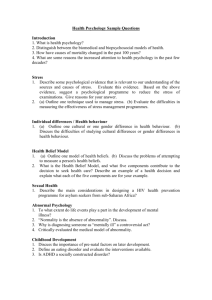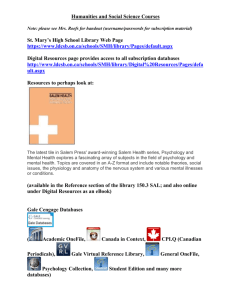
EDUCATIONAL
PSYCHOLOGY
REFLECTION FOR ACTION
Canadian Edition
O’Donnell, D’Amico, Schmid, Reeve, Smith
CHAPTER 6
Behavioural Learning Theory
Chapter 6 Behavioural Learning
Theory
• Themes of the chapter
– Students can learn the behaviours, skills,
and self-regulatory abilities they need to
function well in school and in life
– A behavioural approach to learning serves
as a foundation for understanding and
discussing how to increase the frequency of
desirable behaviours in students and
decrease undesirable behaviours
Educational Psychology, Canadian Edition
Guiding Questions
• How do teachers who adhere to behavioural,
cognitive, and sociocultural approaches
describe learning?
• What kinds of learning can be described by
behavioural learning theory?
• How do different forms of reinforcement affect
behaviour and performance?
• How can teachers increase the frequency of
desirable behaviours and decrease that of
undesirable behaviours?
(continued)
Educational Psychology, Canadian Edition
Guiding Questions (continued)
• How can teachers help students learn selfmanagement?
• How can teachers use behavioural learning
principles in instruction?
• How might teachers use behavioural learning
theory with diverse learners and learners with
special needs?
• What are some limitations of behavioural
learning theory?
Educational Psychology, Canadian Edition
Behavioural, Cognitive, and
Sociocultural Theories of Learning
• Learning – a relatively permanent change
in behaviour or knowledge that occurs as a
result of experience
• Environment Individual Behaviour
Educational Psychology, Canadian Edition
Behavioural, Cognitive, and
Sociocultural Theories of Learning
• Behavioural – environment/behaviour
– The environment strongly influences
behaviour
• Cognitive – individual
– Interpretation of stimuli in the environment
may vary by individual
• Sociocultural – environment/behaviour
– Influence of environment on behaviour of
individuals (includes history of practice and
expertise in the community)
Educational Psychology, Canadian Edition
Educational Psychology, Canadian Edition
Principles of Behavioural Learning
Theory
• Contiguity – a condition in which two
events occur at the same time
• In behavioural learning this might take one
of two forms
– Classical conditioning
– Associative learning
Educational Psychology, Canadian Edition
Classical Conditioning
Stimuli and Responses
• Unconditioned stimulus – stimuli, that, without
prior learning, produces an automatic
physiological response
• Unconditioned response – behaviour that is
produced in response to a stimulus without
prior learning, automatic physiological
response
• Conditioned response – response that is linked
to a particular stimulus through conditioning by
being paired with the stimulus
Educational Psychology, Canadian Edition
Classical Conditioning
• The association of automatic responses
with new stimuli (pairing of stimulus and
response)
– Unconditioned stimulus/unconditioned
response
– Unconditioned stimulus/conditioned
response
Educational Psychology, Canadian Edition
Your Turn
• Give an example from a classroom
situation, of classical conditioning
Educational Psychology, Canadian Edition
Operant Learning Theory
• Actions by a learner, the consequences of
which influence further behaviour
– Mediated by the law of effect: phenomenon
in which behaviour that produces good
effects tends to become more frequent,
while behaviour that produces bad effects
tends to become less frequent
Educational Psychology, Canadian Edition
Consequences
• The good or bad effects that follow a
person’s behaviour
• Influence future frequency of the behaviour
– Reinforcers: influence the person to engage
in the behaviour more often
– Punishers: cause behaviour to become less
frequent
Educational Psychology, Canadian Edition
Reinforcement
• Reinforcer – a consequence of a
behaviour that is satisfying to the learner
– Positive reinforcer: an environmental event
that, when given, increases the frequency
of a behaviour
– Negative reinforcer: any environmental
event that, when removed, increases the
frequency of a behaviour
Educational Psychology, Canadian Edition
Rewards
• Anything given in return for another
person’s service or achievement
– A reward functions as a reinforcer
only if the learner values it
Educational Psychology, Canadian Edition
Rewards
• Why are extrinsic rewards prevalent in
schools?
• Many teachers believe that learners need
some added external gain to give them the
motivation they lack
– However, when the rewards are no longer
offered, the effectiveness of external
rewards declines and the once-contingent
behaviour quickly returns to the previous
level
Educational Psychology, Canadian Edition
Educational Psychology, Canadian Edition
Patterns of Reinforcement
• Continuous reinforcement – reinforcement
that is provided after every performance of
a behaviour
• Variable schedules – reinforcement only
some of the time
– Interval schedule: a schedule of
reinforcement based on time
– Ratio schedule: a schedule of reinforcement
base on the number of behaviours
Educational Psychology, Canadian Edition
Four Variable Schedules
•
•
•
•
Fixed interval schedule
Fixed ration schedule
Variable interval schedule
Variable ratio schedule
Educational Psychology, Canadian Edition
Punishment
• Punisher – a consequence of behaviour
that reduces the possibility of the
behaviour’s recurrences
– Positive punisher – any environmental
event that, when given, decreases the
frequency of a behaviour
– Negative punisher – any event that, when
removed, decreases the frequency of a
behaviour
Educational Psychology, Canadian Edition
Negative Punishers to Suppress
Behaviour
• Response cost – each occurrence of the
undesirable behaviour will cost the student
some attractive resource
• Time-out – a procedure in which the
teacher directs the student to leave a
highly reinforcing environment and go to
one that offers little or no reinforcement
Educational Psychology, Canadian Edition
Four Negative Side Effects
of Punishment
• Punishment teaches aggression
• Punishment produces negative emotions
• Punishment undermines the quality of the
interpersonal relationship
• Punishment often exacerbates
misbehaviour
Educational Psychology, Canadian Edition
Ways to Promote Good behaviour
• Help students achieve academic success
• Use behavioural contracting
• Encourage positive reinforcement of
appropriate behaviour
• Use individual and group counseling
• Encourage disciplinary consequences that
are meaningful to students and have an
instructional/reflection component
• Provide social skills training
Educational Psychology, Canadian Edition
Your Turn
• Describe a situation in the classroom when
you can use a positive reinforcer and
another when you can use a negative
reinforcer
Educational Psychology, Canadian Edition
Applied Behaviour Analysis
• Discriminant stimuli – antecedent cues that
allow the learner to predict the likelihood of
reinforcement
A: B
C
• A (antecedent cue) sets the stage for B
(behaviour) that causes C
(consequences)
Educational Psychology, Canadian Edition
Behavioural Learning Theory and
Diverse Learners
• The more that teachers differ from their
students, the greater the likelihood that
they will have different definitions of
desirable and undesirable behaviours
• Creating a respectful classroom can be
made more difficult when students see
differences all around them
Educational Psychology, Canadian Edition
Behavioural Learning Theory and
Special Needs Students
• Teachers need to give special needs
students positive behavioural supports
• If a child misbehaves in a classroom he or
she cannot be removed if parents can
prove the behaviour was related to the
child’s disability
Educational Psychology, Canadian Edition
Increasing Desirable Behaviours
• Shaping – reinforcement of gradual
approximations of the desired behaviour
• Incentive – environmental event that attracts
a person toward a particular course of action
• Prompts – physical, verbal, or other assists
that help a person perform a desired
behaviour that he or she would be unlikely to
perform without such assistance
Educational Psychology, Canadian Edition
Downsides of Rewards
• Undermine intrinsic motivation
• Interfere with learning
• Hinder autonomous self-regulation
Educational Psychology, Canadian Edition
Decreasing Undesirable Behaviours
•
•
•
•
•
•
Verbal reprimands
Response cost
Differential reinforcement
Inductive reasoning
Observational learning
Scaffolding/tutoring
Educational Psychology, Canadian Edition
Why Do Students Misbehave?
• Teachers might not have provided
interesting activities, asked challenging
questions, and known how to engage
students in learning
• Students might find themselves in
environments that don’t meet their needs
Educational Psychology, Canadian Edition
Promoting Self-Management
• To promote self-management, students must
be taught :
–
–
–
–
–
Goal setting
Self-instruction
Self-observation
Self-evaluation
Self-consequences
Educational Psychology, Canadian Edition
Classroom Management
• Create a positive climate by:
– Organizing the physical environment in ways
that will promote desirable behaviour
– Establishing expectations for desirable
behaviour
– Creating caring, inclusive classrooms
• Also, by promoting the following conditions
and providing more time for learning
– Positive social behaviour
– Positive relationships
– Cooperation among students
Educational Psychology, Canadian Edition
Contracts and Contingencies
• Create contracts with students to promote
new behaviours
• Create a group contingency program with
reinforcements and punishments affecting
the entire class
Educational Psychology, Canadian Edition
Influences of Behavioural
Learning on Instruction
• Mastery learning – all students can
achieve a set of educational objectives
with appropriate instruction and enough
time to learn
– Feedback and knowledge of results are
important to mastery learning
Educational Psychology, Canadian Edition
Instructional Technology
• Behavioural learning theory has influenced
some aspects of the design of software
and computer-assisted instructional
programs, such as those that provide drill
and practice
Educational Psychology, Canadian Edition
Limitations of Behavioural
Learning Theory
• Cannot adequately explain complex learning
• Relies on segmentation of curricular into
chunks, but this is not always possible for
some curricular content, therefore cannot
always measure outcomes discretely in
many domains
• Complex thinking skills cannot be taught
through behavioural programming
• Overreliance on tangible reinforcement can
have negative effects
Educational Psychology, Canadian Edition
Copyright
Copyright © 2008 John Wiley & Sons Canada, Ltd. All rights
reserved. Reproduction or translation of this work beyond
that permitted by Access Copyright (the Canadian copyright
licensing agency) is unlawful. Requests for further
information should be addressed to the Permissions
Department, John Wiley & Sons Canada, Ltd. The purchaser
may make back-up copies for his or her own use only and not
for distribution or resale. The author and the publisher
assume no responsibility for errors, omissions, or damages
caused by the use of these files or programs or from the use
of the information contained herein.
Educational Psychology, Canadian Edition





